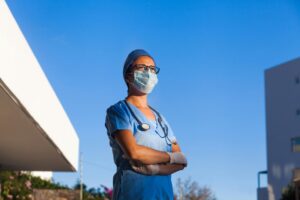The Unsung Heroes: Medical Professionals Volunteering Their Way to a Better World


In the labyrinth of our modern healthcare system, amidst the hustle and bustle of hospitals and clinics, a group of individuals stands out for their medical prowess and boundless compassion and altruism. They are the medical professionals who dedicate their time, expertise, and, often, their hearts to volunteer work.In a world where healthcare access is unequal, and resources are scarce, these individuals shine as beacons of hope, bridging gaps and healing wounds, not just of the body, but also of the soul. Additionally, their dedication underscores the importance of compassion and solidarity in addressing global health disparities. This article explores the profound impact of medical professionals volunteering their skills and the ripple effects of their selfless acts.
The Heart of Volunteering
Volunteering in the medical field is not merely about providing medical care; it’s about connecting with humanity on the most fundamental level. Whether traveling to remote villages to offer healthcare in underserved communities or working tirelessly in disaster zones to aid those in need, these medical professionals embody the essence of humanitarianism. Their motivations are as diverse as the patients they serve. Some are driven by a sense of duty, others by empathy, and many by a deep-seated desire to make a tangible difference in the lives of others.
Bridging Gaps in Healthcare Access
One of the most significant contributions of medical volunteers is their role in bridging gaps in healthcare access. In many parts of the world, access to medical care is a luxury rather than a right. Remote villages, marginalized communities, and areas affected by conflict or natural disasters often lack essential healthcare services. Medical volunteers enter these gaps, bringing healthcare directly to those most need it. By doing so, they alleviate suffering and empower communities to lead healthier, more productive lives.
Disaster Relief and Humanitarian Aid
Natural disasters, conflicts, and humanitarian crises can devastate local healthcare systems and infrastructure. Medical volunteers are often among the first responders in these dire situations, providing critical medical care and support to affected populations. From setting up field hospitals to conducting emergency surgeries, their expertise and dedication save countless lives in the face of adversity. Furthermore, their presence brings a glimmer of hope amidst chaos, serving as a beacon that reminds survivors that they are not alone in their darkest hours.
Teaching and Capacity Building
Beyond immediate medical interventions, medical volunteers play a vital role in teaching and capacity building. Sharing their knowledge and skills with local healthcare workers empowers communities to become more self-sufficient in addressing their healthcare needs. Training programs, workshops, and mentorship initiatives led by medical volunteers help strengthen healthcare systems from within, ensuring that their impact extends beyond their volunteer missions. Essentially, they plant seeds of knowledge that continue to bear fruit long after returning home.
Personal Growth and Fulfillment
For medical professionals, volunteering offers more than just an opportunity to give back—it’s a personal growth and fulfillment journey. Stepping outside the familiar confines of their daily practice exposes them to new challenges, perspectives, and ways of thinking. It pushes them out of their comfort zones, forcing them to adapt and innovate in resource-limited settings. Moreover, the connections forged with patients, colleagues, and communities leave an indelible mark on their hearts, reminding them of the profound impact they can have on the world beyond the confines of their clinics and hospitals.
Overcoming Challenges
While noble in their intentions, medical volunteering indeed has its challenges. Nevertheless, these challenges do not deter the dedication and resilience of those who volunteer their time and expertise to serve others. Limited resources, cultural differences, and language barriers can present formidable obstacles to effective healthcare delivery.
Furthermore, the emotional toll of witnessing suffering and loss firsthand can take a heavy toll on volunteers’ mental well-being. Nevertheless, despite these challenges, medical volunteers persevere, driven by their unwavering commitment to serving others and making a positive difference in the world.
The Ripple Effect
The impact of medical volunteering extends far beyond the individuals directly served. Like ripples in a pond, their actions create a cascade of positive effects reverberating throughout communities and beyond. Improving access to healthcare, building local capacity, and inspiring others to join the cause makes a ripple effect that transforms lives, strengthens communities, and creates a more compassionate world.
Medical professionals who volunteer their time and expertise are beacons of hope and compassion in a world of inequalities and injustices. Their selfless actions bridge gaps in healthcare access, provide critical relief in times of crisis and empower communities to lead healthier, more resilient lives. Their impact extends far beyond the confines of clinics and hospitals, creating a ripple effect of positive change that touches the lives of countless individuals and communities worldwide. As we celebrate their tireless dedication and unwavering commitment to serving others, let us remember that true healing begins not in the hands of a single individual; instead, it emerges from the collective efforts of those who dare to care. Additionally, this collective endeavor underscores the power of unity and collaboration in fostering positive change.
